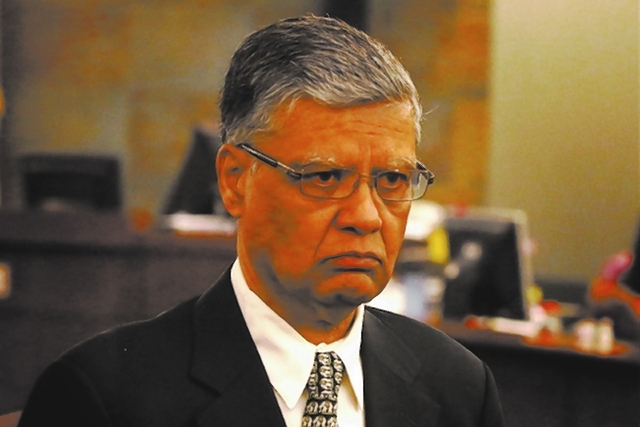Colonoscopy mill operator doesn’t concern insurance company
To hear Health Plan of Nevada’s advocates tell it, Dr. Dipak Desai was a master of deception.
He was a real sleight-of-hand artist, a veritable David Copperfield of the colonoscopy. The fact Desai and a nurse anesthetist are on trial facing a list of criminal charges including second-degree murder illustrates the fact he’s the one at fault.
HPN, on the other hand, is a dedicated and charitable servant of nearly 500,000 Nevadans’ health care needs. Its reputation has been besmirched by last month’s staggering $500 million punitive damage award for its role in the hepatitis C outbreak at Desai’s now-closed Endoscopy Center of Southern Nevada.
As it prepares its appeal, HPN and parent company United Healthcare are restating their position. It wasn’t the insurance company’s job to look over the doctor’s shoulder, its officials argue. He was credentialed by the state, had a reasonably sound reputation and, of course, gave a good rate.
The unjust judgment emanating from a highly charged civil litigation won’t hold up on appeal, United Healthcare deputy general counsel Christopher Zaetta explained in a recent meeting with the Review-Journal. And if the verdict were to stand, costs will be passed along to policyholders, and health care in Nevada will be disrupted.
A tersely worded April 9 company statement said: “The number announced today has no grounding whatsoever in reality — it represents fantasy damages, not punitive damages.”
Speaking of fantasies. Insurance companies have a very hands-on role when it comes to defining benefits, choosing network physicians and controlling costs; but Zaetta repeatedly emphasized HPN relies on the expertise of Nevada’s credentialing boards and professional commissions to ensure professional standards.
The fact Nevada has a long tradition of incestuous professional oversight and underregulated industries was of essentially no interest to him. The insurance company shouldn’t have been liable for failing to spot Desai’s deception, despite the fact he was running an endoscopy mill.
“If you accept that theory as a viable cause of action, what you’re really talking about is having your insurance company in the delivery room where the care is being given by the doctors,” Zaetta said. “And that’s not something that any insurance company does. That’s not something that we do. That’s not something that’s good for health care in general, in our view. And the only way that we could really ensure that malpractice of independent doctors on our network occurred is to have somebody in there monitoring them every day.
“… We have a reliance on agencies, government agencies and private agencies that are tasked with this type of monitoring. That’s how insurance companies do it. We rely on their review of doctors in making determinations over credentialing and monitoring. And that’s the way it works, and that’s the way it should work. The problem that we ran into here is a doctor who was in a clinic who was intent on hiding what they were doing.”
The message is clear: HPN is officially satisfied with Nevada’s system of physician oversight and credentialing. Desai was the problem, not the medical boards he had a hand in influencing.
Desai was dangerously chintzy with medical supplies and reused syringes, but he went first cabin when it came to making pals in politics. But the fact a guy so reckless could so easily wield clout on professional boards doesn’t disturb the HPN officials.
If those boards failed to do their due diligence, well, that’s not the insurance company’s area of expertise. The trouble with that head-in-the-sand legal argument is obvious: Desai wasn’t a solo practitioner; he was an HPN-sanctioned factory boss with a flawed assembly line.
HPN can’t bring itself to admit the undeniable: Whatever his skills of deception, Desai’s colonoscopy factory flourished in a state with a long history of inadequate physician credentialing and professional oversight.
If the health insurance giant didn’t know it then, it at least ought to acknowledge it now — and work to improve the system.
John L. Smith’s column appears Sunday, Tuesday, Wednesday and Friday. E-mail him at jsmith@reviewjournal.com or call (702) 383-0295.

















